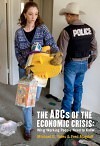Americas

The economic crisis has created a host of problems for working people: collapsing wages, lost jobs, ruined pensions, and the anxiety that comes with not knowing what tomorrow will bring. Compounding all this is a lack of reliable information that speaks to the realities of workers. Commentators and pundits seem more confused than anyone, and economists—the so-called “experts”—still cling to bankrupt ideologies that failed to predict the crisis and offer nothing to explain it. | more…
This article is excerpted from Understanding the Venezuelan Revolution: Hugo Chávez Talks to Marta Harnecker to be published by Monthly Review Press in September. The book covers a wide range of topics, including Chávez’s political formation, the transformation currently taking place in Venezuela, and its place in the global context. In what follows, Chávez recounts the events of the failed coup d’etat of April 11, 2002.—Eds | more…
The United States and the Colombian ruling oligarchy have, since the 1960s, repeatedly implemented socioeconomic and military campaigns to defeat the Fuerzas Armadas Revolucionarias de Colombia–Ejército del Pueblo, the Revolutionary Armed Forces of Colombia–People’s Army (FARC–EP). However, this offensive, whose main purpose is to maintain capitalist accumulation and expansion, has resulted in an embarrassing setback for U.S. imperialism and the Colombian ruling class. In a time of growing and deepening U.S. imperialism, it is important to examine this failure. Over the past four decades, despite U.S. efforts, support has risen for what has been the most important continuous military and political force in South America opposing imperialism. I examine how the FARC–EP has not only maintained a substantial presence within the majority of the country but has responded aggressively to the continuing counterinsurgency campaign. I also show as false the propaganda campaign of the U.S. and Colombian governments claiming that the FARC–EP is being defeated. This analysis provides an example of how a contemporary organic, class-based sociopolitical movement can effectively contend with imperial power in a time of global counterrevolution | more…
La Paz, the Bolivian capital, rests in a deep valley in the heart of the Andes. The geographical terrain of the city is marked clearly with deep class divisions and the racist legacies of Spanish colonial impositions and ongoing internal colonialism, present since the founding of the republic in 1825. The indigenous peoples-over 60 percent of the population according to the 2001 census-have suffered at the bottom of a wickedly steep social hierarchy that whitens in accordance with class privilege | more…

Embedded With Organized Labor describes how union members have organized successfully, on the job and in the community, in the face of employer opposition now and in the past. The author has produced a provocative series of essays—an unusual exercise in “participatory labor journalism” useful to any reader concerned about social and economic justice. As workers struggle to survive and the labor movement tries to revive during the current economic crisis, this book provides ideas and inspiration for union activists and friends of labor alike. | more…
Andre Gunder Frank, one of the leading radical social scientists of the late twentieth century and a long-time friend and contributor to Monthly Review and Monthly Review Press, died on April 23, 2005, at age seventy-six | more…
The Mexican labor movement has been undergoing a profound transformation in the last ten years, the result of twenty years of neoliberal economic policies and the transformation of the Mexican one-party state. A new independent labor movement has emerged which has not only broken with the old state-controlled labor-relations system, but has also put itself forward as the leader of the social movements, and, at the moment, appears as a real political force that can challenge the government. | more…
Last month, the National Union of Venezuelan Workers (UNT) turned two. Since its inception in May 2003, the UNT has been at the center of debates surrounding the advances of Venezuela’s revolution in the labor arena. At root, these debates turn on issues of worker control: over their factories and over their unions. Democracy is at the heart of the attempt by Venezuelan workers to reinvent a labor movement long characterized by corruption and class collaboration | more…
With the failure of its three previous attempts since 2002 to topple the Bolivarian Revolution of President Hugo Chávez in Venezuela, Washington has recently announced a new “containment” strategy for crippling the democratically elected and socialist-oriented government of Latin America’s leading oil power | more…

2005 marks the fiftieth anniversary of the death of Albert Einstein and the centennial of the publication of five of his major scientific papers that transformed the study of physics. Einstein’s insights were so revolutionary that they challenged not only established doctrine in the natural sciences, but even altered the way ordinary people saw their world. By the 1920s he had achieved international popular renown on a scale that would not become usual until the rise of the contemporary celebrity saturated tabloids and cable news channels. His recondite scientific papers as well as interviews with the popular press were front page news and fodder for the newsreels. Usually absent, however, was any sober discussion of his participation in the political life of his times as an outspoken radical-especially in profiles and biographies after his death | more…
Alcasa, a state-owned aluminum processing plant in the southeastern state of Bolívar, has long been an important employer in a region where the lion’s share of Venezuela’s mining and processing plants are located. Yet since the mid-1990s it has been plagued by inefficiency and corruption. According to Trino Silva, secretary general of the union, Alcasa’s production has been in “the red” for the past sixteen years. Though the aluminum they produce is in high demand and despite considerable production increases over the past few years, the company has been unable to turn a profit. Silva blames a corrupt factory management that used Alcasa as its piggy bank throughout the 1990s, all the while holding the threat of privatization over workers’ heads. It was no idle threat. A few miles down the road, SIDOR, one of Latin America’s largest steel plants and long the pride of the state Venezuelan Corporation of Guyana (CVG), was privatized in 1997. From a workforce approaching 20,000 full-time direct employees (with several thousand more contract and temporary workers) in the late 1980s, SIDOR has downsized to only 4,000 direct employees and approximately 6,000 contract workers | more…

In this new edition of Why Unions Matter, Michael D. Yates shows why unions still matter. Unions mean better pay, benefits, and working conditions for their members; they force employers to treat employees with dignity and respect; and at their best, they provide a way for workers to make society both more democratic and egalitarian. Yates uses simple language, clear data, and engaging examples to show why workers need unions, how unions are formed, how they operate, how collective bargaining works, the role of unions in politics, and what unions have done to bring workers together across the divides of race, gender, religion, and sexual orientation. | more…



